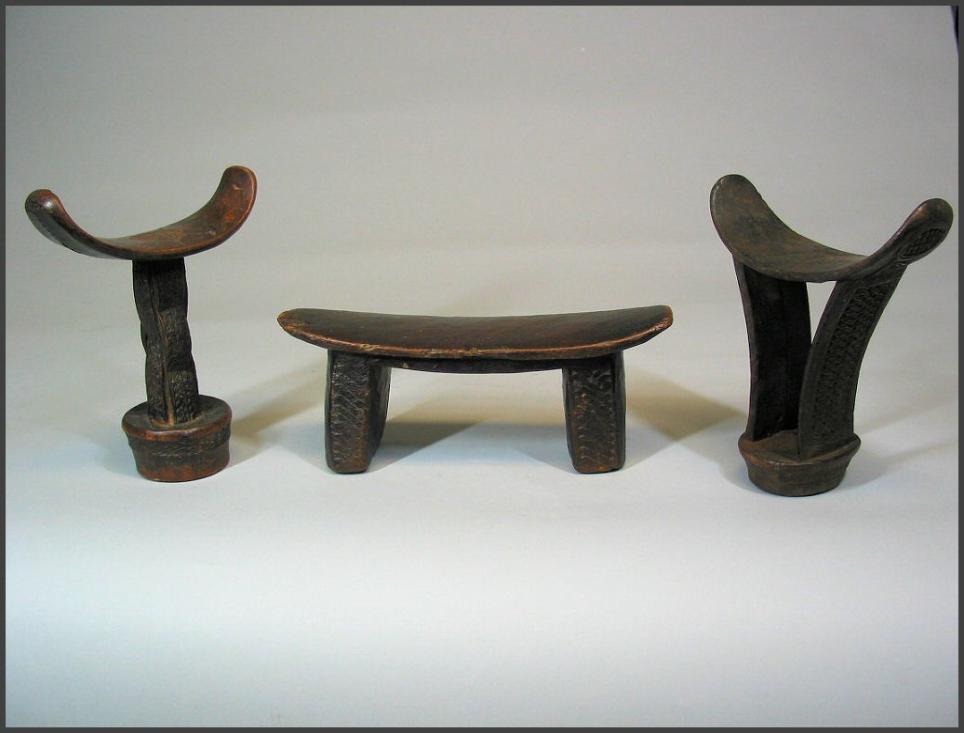Other than wooden barkin

You are using an out of date browser. It may not display this or other websites correctly.
You should upgrade or use an alternative browser.
You should upgrade or use an alternative browser.
Who knows the name of this
- Thread starter Libaaxseendheer
- Start date
This one is easy akhi
What region is that fromIts called Boni.
What do your folks call it?This one is easy akhi
What region is that from
http://somaliword.com/4490-2/
Apparently its from Southern Somalia and North East Kenya aka NFD.
''Men in East Africa used headrests as pillows and also to show their status. Headrests were used by the Boni of NE Kenya and southern Somalia and by Somali nomads.
Men’s headrests generally featured a smaller base, making them unstable to sleep on,
while the rectangular bases of women’s headrests were more stable. The unbalanced base made the headrest an emblem of alertness and the ability to wake to fight.
Made of sturdy light wood, the headrests were used on beds and carried by herdsmen, who also used them to rest while keeping an eye on their herds.
Boni shepherds used to rest while standing on one leg, with the neckrest on their shoulder. As their base was so small, the resting person could not fall to sleep without falling over.
Patterns on Somali and Boni headrests probably reflect regional Islamic influences. Some academics see the patterns and iconography
as a sort of shorthand for prayer, to ensure protection of the sleeper.''
East Africa, Southern Somalia, Somali or Boni peoples, ca. late 19th to early 20th century CE. An elegant carved wooden headrest or barkin from the Boni or Somali peoples of Somalia. The headrest is carved from a single piece of fine-grained wood known as hagar in Somali (or yucub) wood.
Youre telling me they slept standing and on one leg at that?http://somaliword.com/4490-2/
Apparently its from Southern Somalia and North East Kenya aka NFD.
''Men in East Africa used headrests as pillows and also to show their status. Headrests were used by the Boni of NE Kenya and southern Somalia and by Somali nomads.
Men’s headrests generally featured a smaller base, making them unstable to sleep on,
while the rectangular bases of women’s headrests were more stable. The unbalanced base made the headrest an emblem of alertness and the ability to wake to fight.
Made of sturdy light wood, the headrests were used on beds and carried by herdsmen, who also used them to rest while keeping an eye on their herds.
Boni shepherds used to rest while standing on one leg, with the neckrest on their shoulder. As their base was so small, the resting person could not fall to sleep without falling over.
Patterns on Somali and Boni headrests probably reflect regional Islamic influences. Some academics see the patterns and iconography
as a sort of shorthand for prayer, to ensure protection of the sleeper.''
Youre telling me they slept standing and on one leg at that?
Staying vigilant is key. You never know when a wild Kenyan or Habesha decides to attack. Askari shit right there.
http://www.randafricanart.com/Boni_headrest_2_Somalia.html

I collected several when I was in Jilib in 1966. There is a different design for women, the one in the middle here. I have only known them as "barkin". The wooden ones are "ka" and a "pillow" in general is "ta".
Very similar ones were in use in Egypt for thousands of years. King Tut had a fancy one. Others were in use in the Turkana basin.
Check this link:
https://www.fitzmuseum.cam.ac.uk/gallery/headrests/gallery/1/index.html

I collected several when I was in Jilib in 1966. There is a different design for women, the one in the middle here. I have only known them as "barkin". The wooden ones are "ka" and a "pillow" in general is "ta".
Very similar ones were in use in Egypt for thousands of years. King Tut had a fancy one. Others were in use in the Turkana basin.
Check this link:
https://www.fitzmuseum.cam.ac.uk/gallery/headrests/gallery/1/index.html
Thanks for explaining I thought it was a torture device maybe. Doing what exactly I don’t know.http://somaliword.com/4490-2/
Apparently its from Southern Somalia and North East Kenya aka NFD.
''Men in East Africa used headrests as pillows and also to show their status. Headrests were used by the Boni of NE Kenya and southern Somalia and by Somali nomads.
Men’s headrests generally featured a smaller base, making them unstable to sleep on,
while the rectangular bases of women’s headrests were more stable. The unbalanced base made the headrest an emblem of alertness and the ability to wake to fight.
Made of sturdy light wood, the headrests were used on beds and carried by herdsmen, who also used them to rest while keeping an eye on their herds.
Boni shepherds used to rest while standing on one leg, with the neckrest on their shoulder. As their base was so small, the resting person could not fall to sleep without falling over.
Patterns on Somali and Boni headrests probably reflect regional Islamic influences. Some academics see the patterns and iconography
as a sort of shorthand for prayer, to ensure protection of the sleeper.''
1966?? How old are uhttp://www.randafricanart.com/Boni_headrest_2_Somalia.html

I collected several when I was in Jilib in 1966. There is a different design for women, the one in the middle here. I have only known them as "barkin". The wooden ones are "ka" and a "pillow" in general is "ta".
Very similar ones were in use in Egypt for thousands of years. King Tut had a fancy one. Others were in use in the Turkana basin.
Check this link:
https://www.fitzmuseum.cam.ac.uk/gallery/headrests/gallery/1/index.html

1966?? How old are u
Old enough to have taught English to your grandparents. I am 76.
Trending
-
Faarax from UK moves to Hargeisa and says hes never going back
- Started by TekNiKo
- Replies: 57
-
Can AI tell that you’re Somali? Check your phenotype here
- Started by empressjamila
- Replies: 123
-
